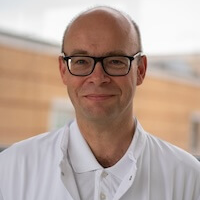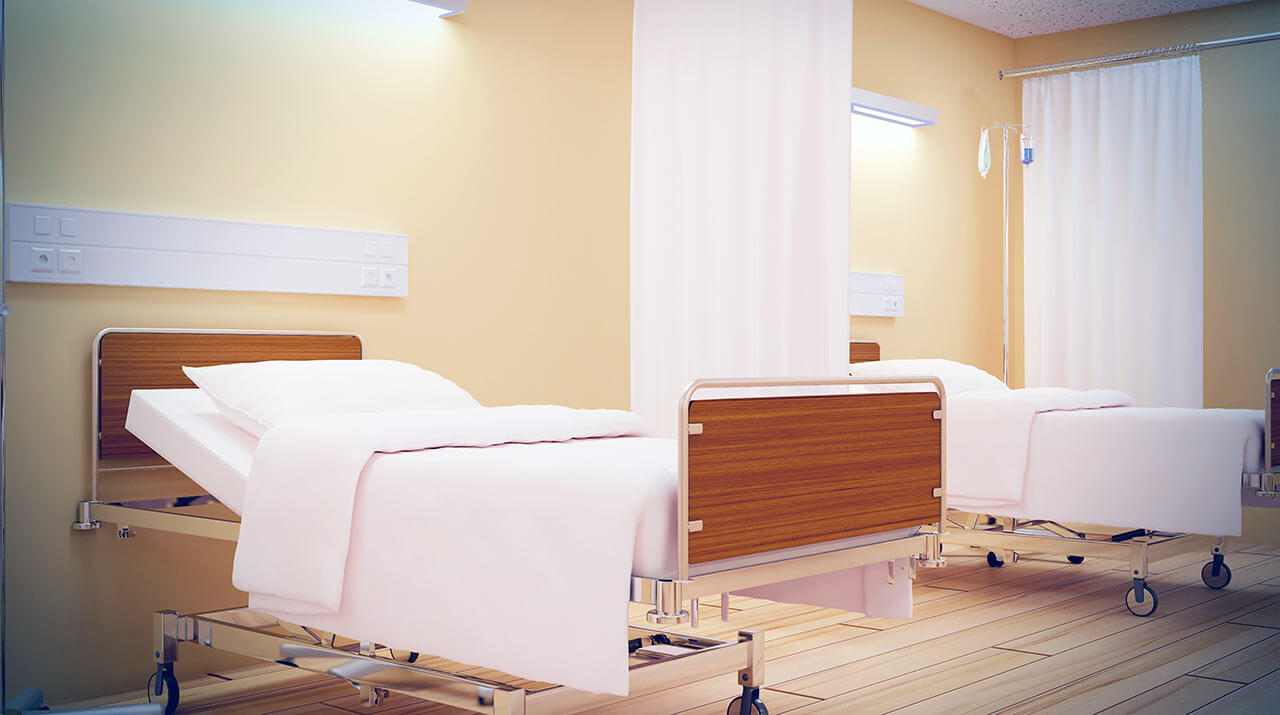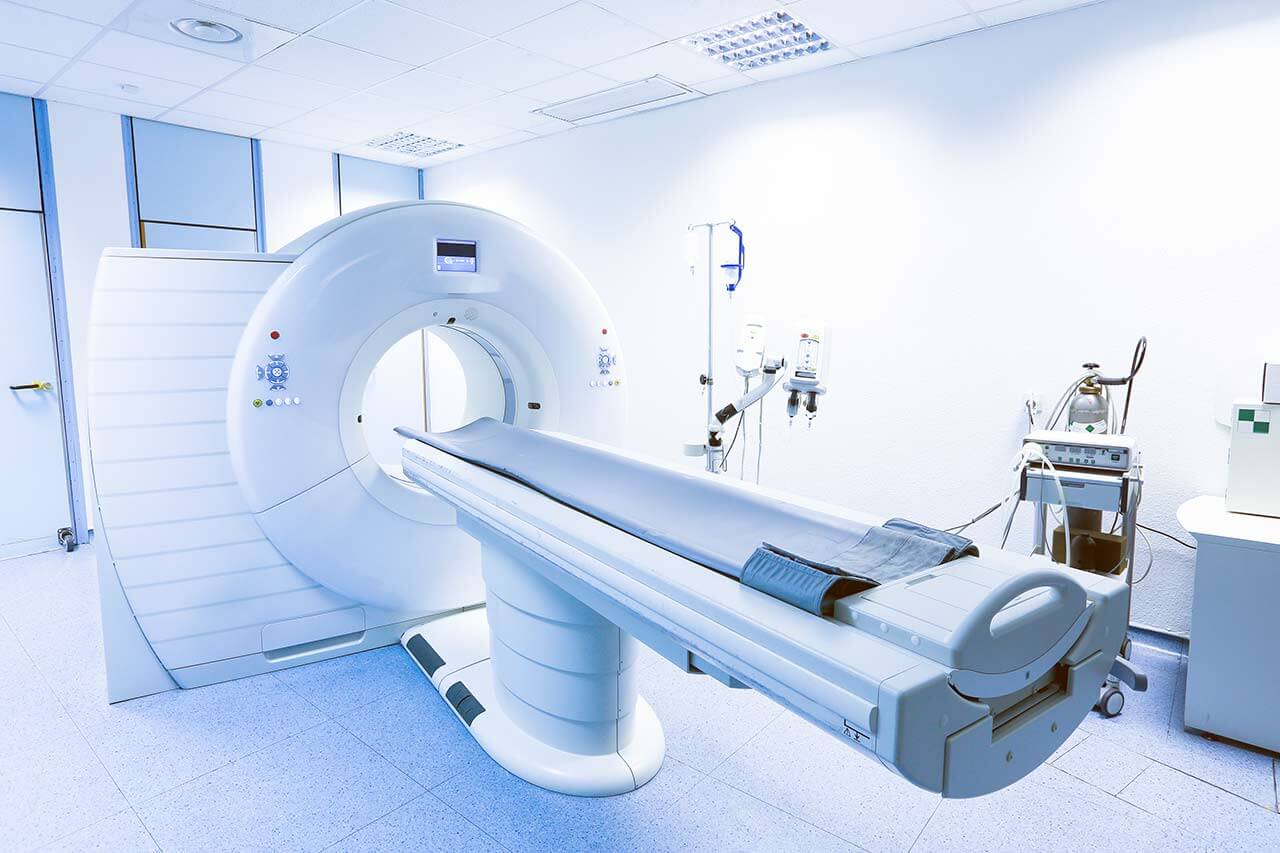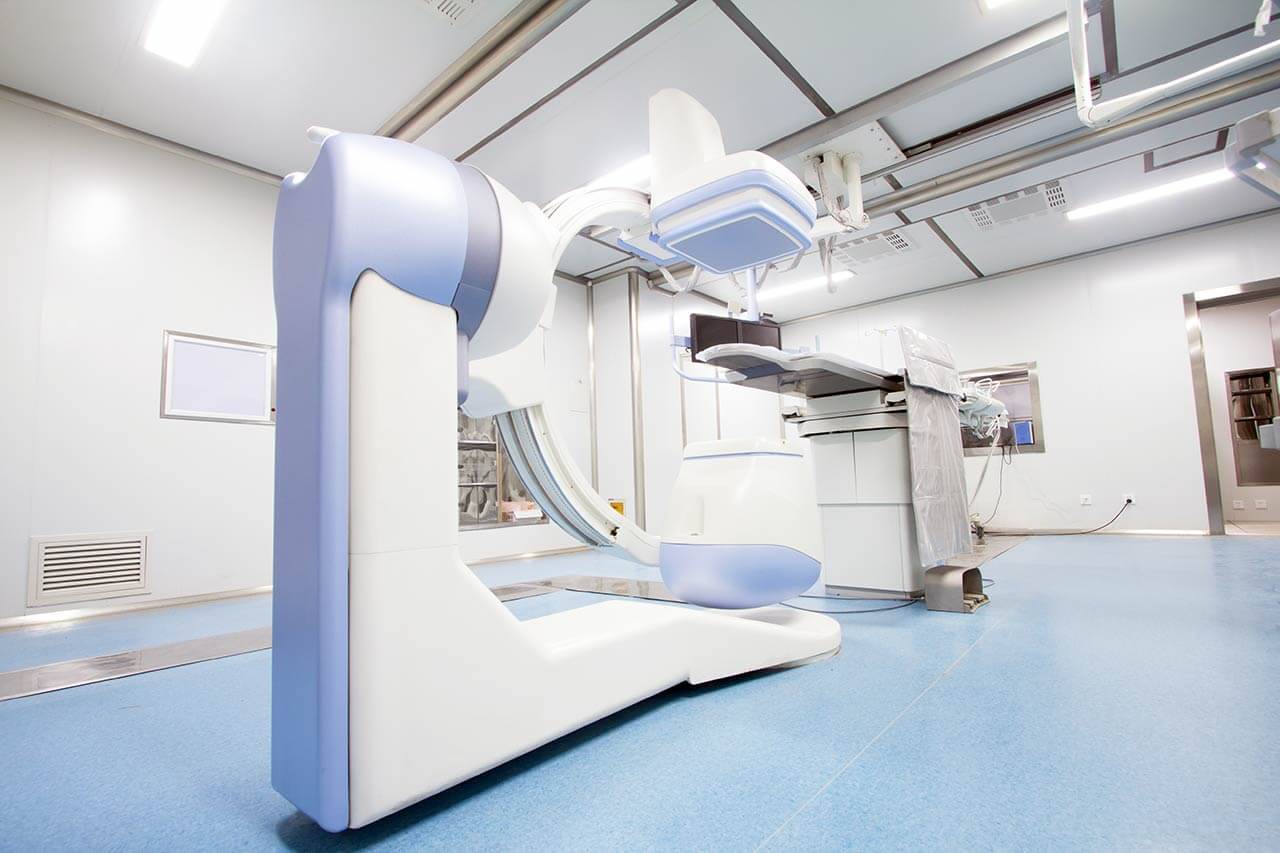
The program includes:
- Initial presentation in the clinic
- clinical history taking
- review of medical records
- physical examination
- laboratory tests:
- complete blood count
- biochemical analysis of blood
- mineral metabolism analysis (Na, K, Ca, Mg)
- lipid metabolism (HDL/LDL, cholesterol,
triglycerides Lip(a), homocysteine) - inflammation indicators (CRP, ESR)
- indicators blood coagulation
- blood gas analysis
- chest x-ray examination
- holter monitoring (24h)
- measurement of arterial blood pressure
- electrocardiogram (ECG)
- pulmonary function test
- echocardiography
- doppler echocardiography
- high-resolution computed tomography (HR-CT)/MRI (on indication 950/1200€)
- CT angiography (on indication 1350€)
- nursing services
- consultation of related specialists
- treatment by chief physician and all leading experts
- explanation of individual treatment plan
(the cost of medicines is not included)
Required documents
- Medical records
- ECG (if available)
Service
You may also book:
 BookingHealth Price from:
BookingHealth Price from:
About the department
The Department of Cardiology, Angiology and Pulmonology at the University Hospital Greifswald offers all the options of modern medicine in the areas of its specialization. Patients can undergo comprehensive diagnostics and effective treatment for heart, blood vessel, and lung diseases here. Of particular interest is the treatment of coronary heart disease, acute and chronic heart failure, arterial hypertension, and cardiac arrhythmias. The department has 2 state-of-the-art Cardiac Catheterization Laboratories, where doctors perform balloon dilatation, vascular stent implantation, laser angioplasty, heart valve repair and replacement, and other advanced interventions. The team of pulmonologists in the department cooperates closely with thoracic surgeons. The doctors most commonly treat chronic obstructive pulmonary disease, interstitial lung disease, lung tumors, and pulmonary hypertension. The treatment is based on drug therapy and endoscopic interventional procedures. The department also successfully performs extracorporeal membrane oxygenation (ECMO) for severe forms of acute respiratory failure. The department has 108 beds. The Head Physician of the department is Prof. Dr. med. Marcus Dörr.
The department's primary clinical focus is on medical care for patients with heart disease. The department has at its command excellent infrastructure available for patient care: modern diagnostic rooms, specialized outpatient clinics, and advanced Cardiac Catheterization Laboratories. The team of the department's cardiologists is convinced that the key to successful treatment is high-precision preliminary diagnostics, and therefore doctors have a perfect command of various non-invasive and invasive diagnostic procedures. The diagnostic process usually begins with the following non-invasive examinations: echocardiography, including transthoracic, transesophageal, stress echocardiography, and 3D/4D echocardiography; resting ECG and long-term ECG monitoring; 24-hour blood pressure monitoring; ultrasound scans of the blood vessels of the brain, lower limb arteries, kidney arteries, and the abdominal aorta. In some cases, a patient may also require invasive diagnostic procedures, including classical coronary angiography and 3D rotational angiography, fractional flow reserve measurement, intravascular ultrasound scans, right and left heart catheterization, pericardial puncture, and myocardial biopsy. The department's patients are thus offered all the diagnostic options available in modern cardiology. Based on the results of cardiac diagnostic testing, an accurate diagnosis is made and an optimal treatment regimen is prescribed.
Treatment for heart disease is also at the highest level. Whenever possible, doctors use only an effective course of drug therapy. In more complex clinical cases, the specialists perform interventional procedures in the Cardiac Catheterization Laboratory. The most demanded therapeutic interventions include percutaneous stent implantation for coronary heart disease, rotablation, transcatheter aortic valve implantation (TAVI), implantation of the MitraClip and Carillion systems for mitral valve insufficiency, percutaneous closure of the patent foramen ovale, and percutaneous closure of the atrial appendage.
The department offers special options for treating heart arrhythmias (heart rhythm disturbances). Successful interventions to implant single, double, and triple chamber pacemakers and defibrillators to normalize the heart rhythm are performed here. The department's cardiologists use in their work reliable devices from such world-famous manufacturers as Medtronic, Biotronik, Boston Scientific, Abbott, and others. Modern types of ablation are also carried out here. Vast experience in the field of pacemaker implantation, combined with advanced technical imaging equipment, allows the specialists of the medical facility to achieve excellent treatment outcomes.
Angiology has also been one of the department's key areas of specialization for many years. In this medical field, doctors diagnose and treat the full range of diseases of the arteries, veins, and lymphatic vessels. Angiologists work closely with physicians from other specialties, including internists, dermatovenereologists, surgeons, diabetologists, nephrologists, radiologists, and neuroradiologists. The doctors regularly meet at a board meeting to discuss clinical cases and develop the most effective treatment regimens. The department's specialists focus on patients with occlusive peripheral arterial disease, abdominal and retroperitoneal artery occlusions, diabetic foot syndrome, renal artery stenosis, abdominal aortic aneurysms, venous thrombosis, pulmonary embolism, phlebothrombosis, thrombophlebitis, and other pathologies. In many cases, doctors manage to carry out drug therapy for vascular pathology. However, patients with complex vascular lesions often require interventional therapeutic procedures such as drug-eluting balloon angioplasty, stent implantation, catheter-based atherectomy, lysis therapy, etc.
Pulmonology is another important area of clinical activity for the department's doctors. The team of pulmonologists treats patients with obstructive airway disease, interstitial lung disease, lung tumors, pulmonary hypertension, and lung infections. The department's therapeutic options include drug therapy, mechanical ventilation, and bronchoscopic procedures. There is also a specialized center in the department that performs extracorporeal membrane oxygenation (ECMO). This type of treatment is indicated for patients with severe acute respiratory failure and is available only in advanced medical facilities.
The department's range of medical services includes the following options:
- Cardiology
- Diagnostic services
- Non-invasive cardiac tests
- Transthoracic and transesophageal echocardiography including 3D/4D echocardiography, contrast-enhanced echocardiography, and stress echocardiography
- Resting and long-term ECG monitoring
- 24-hour blood pressure monitoring
- Ergometry and spiroergometry
- Spirometry, body plethysmography, and lung diffusion capacity measurement
- Ultrasound scans: duplex sonography of the blood vessels of the brain, lower limb arteries, kidney arteries, and abdominal arteries
- Non-invasive electrophysiological studies: an event recorder, a passive orthostatic test (a tilt table test) and an ajmaline provocation test for suspected Brugada syndrome
- Invasive cardiac tests
- Coronary angiography, including 3D rotational angiography
- Fractional flow reserve measurement
- Intracoronary tomography with intravascular ultrasound and optical coherence tomography
- Right heart catheterization at rest and during exercise with invasive pressure measurement in the pulmonary circulation
- Pericardial puncture (diagnostic and therapeutic)
- Myocardial biopsy for the differential diagnostics of heart failure
- Invasive electrophysiological studies: 3D mapping with the CARTO® system and intravascular ultrasound
- Non-invasive cardiac tests
- Therapeutic services
- Conservative treatment
- Drug therapy
- Interventional treatment
- Coronary angioplasty (PTCA) and stent implantation for coronary heart disease
- Reopening of chronic coronary occlusions
- Treatment of extended stenoses of blood vessels with severe calcification (rotablation)
- Transcatheter aortic valve implantation (TAVI)
- Implantation of the MitraClip and Carillion systems for mitral valve insufficiency
- Closure of a patent foramen ovale/atrial septal defect
- Implantation of an atrial appendage occluder
- Implantation of single, double, and triple chamber pacemakers and defibrillators
- Ablation
- Conservative treatment
- Diagnostic services
- Angiology
- Diagnostic services
- Color duplex sonography of the cerebral vessels, limb arteries, renal arteries, and abdominal blood vessels
- Compression ultrasonography of the veins of the lower limbs
- Light reflection plethysmography
- Capillary microscopy
- Treadmill ergometry
- Therapeutic services
- Conservative treatment
- Drug therapy
- Interventional treatment
- Drug-eluting balloon angioplasty
- Stent implantation
- Catheter-based atherectomy
- Lysis therapy
- Conservative treatment
- Diagnostic services
- Pulmonology
- Diagnostic services
- Flexible and rigid diagnostic bronchoscopy
- Transthoracic and endobronchial ultrasound scans
- Pulmonary function tests
- Therapeutic services
- Conservative treatment
- Drug therapy
- Interventional treatment
- Flexible and rigid therapeutic bronchoscopy
- Artificial lung ventilation
- Extracorporeal membrane oxygenation (ECMO)
- Conservative treatment
- Diagnostic services
- Other diagnostic and treatment methods in the field of cardiology, angiology, and pulmonology
Curriculum vitae
Higher Education and Postgraduate Training
- 2021 Additional qualification in Sports Cardiology, German Cardiac Society.
- 2018 Additional qualification in Heart Failure, German Cardiac Society.
- 2016 - 2017 Postgraduate Training in Heart Failure Treatment, European Society of Cardiology (ESC) and University of Zurich.
- 1999 Habilitation, Humboldt University of Berlin.
- 2009 Habilitation in Internal Medicine, University Hospital Greifswald.
- 2008 Board certification in Cardiology, University Hospital Greifswald.
- 2006 Board certification in Internal Medicine, University Hospital Greifswald.
Professional Career
- Since April 2023 Acting Head Physician of the Department of Cardiology, Angiology and Pulmonology at the University Hospital Greifswald.
- Since March 2013 Professor of Prevention of Cardiovascular Diseases and Epidemiology.
- Since April 2001 Physician in the Department of Cardiology, Angiology and Pulmonology at the University Hospital Greifswald.
- Since 2011 Principal Investigator at the German Centre for Cardiovascular Research (DZHK).
Memberships in Professional Societies
- Fellow of the European Society of Cardiology (FESC)
About hospital
According to the reputable Focus magazine, the University Hospital Greifswald is included in the ranking of the best medical complexes throughout Germany!
The hospital is one of the oldest healthcare facilities in Germany, with long traditions and an excellent reputation. The history of the hospital begins in 1456, when the Faculty of Medicine at the University of Greifswald was founded. During this time, the hospital has managed to earn recognition in the national medical arena and gain prestige abroad. The hospital has 19 institutes and 21 specialized departments. The key to successful clinical practice is the combination of state-of-the-art equipment and highly qualified medical personnel who are actively engaged in the development of effective medical techniques and implement them in everyday practice.
The medical team of the university hospital has more than 4,400 employees, including world-famous professors who regularly undergo advanced training in the leading European and American hospitals, where they share their experience with foreign specialists. The doctors at the medical facility annually treat about 180,000 patients. At the same time, the specialists often provide medical care to patients with complex clinical cases, even in those cases that doctors at other medical centers consider hopeless. The hospital has more than 1,000 beds for inpatients, and many highly-specialized outpatient clinics are available in the medical facility for counseling and outpatient medical care.
The hospital presents all the fields of modern medicine. According to Focus magazine, the medical complex is recognized as one of the best in Germany for treating bowel cancer, bladder cancer, malignant brain tumors, skin cancer, multiple sclerosis, Parkinson's disease, dementia, cardiovascular pathologies, knee and hip pathologies, as well as ophthalmic and proctologic diseases. Diagnostic and therapeutic procedures are carried out in strict accordance with national and international standards, which ensures top-class medical care.
The medical team at the hospital makes sure that each patient feels as comfortable as possible during the therapeutic process. Doctors and nursing staff show humanity and understanding, striving to support each patient in every possible way on the path to recovery.
Photo: (с) depositphotos
Accommodation in hospital
Patients rooms
The patients of the University Hospital Greifswald live in comfortable single and double rooms. The patient rooms are made in bright colors and are quite cozy. The furnishings of a standard patient room include an automatically adjustable bed, a bedside table, a TV, and a telephone. The patient room has a table and chairs for receiving visitors. There is also free Wi-Fi in the patient rooms.
If desired, patients can live in enhanced-comfort rooms. In such rooms, patients are additionally offered toiletries, a bathrobe, and a change of towels.
Meals and Menus
The patients of the hospital are offered three healthy and tasty meals a day: a buffet breakfast, a hearty lunch, and dinner. The hospital also houses a cafeteria where one can have a tasty snack, a cup of aromatic coffee, tea, or soft drinks.
Patients staying in enhanced-comfort rooms are offered a special menu with a wide range of main courses, appetizers, desserts, and drinks.
Further details
Standard rooms include:
Religion
The services of representatives of religions are available upon request.
Accompanying person
Your accompanying person may stay with you in your patient room or at the hotel of your choice during the inpatient program.
Hotel
You may stay at the hotel of your choice during the outpatient program. Our managers will support you for selecting the best option.




